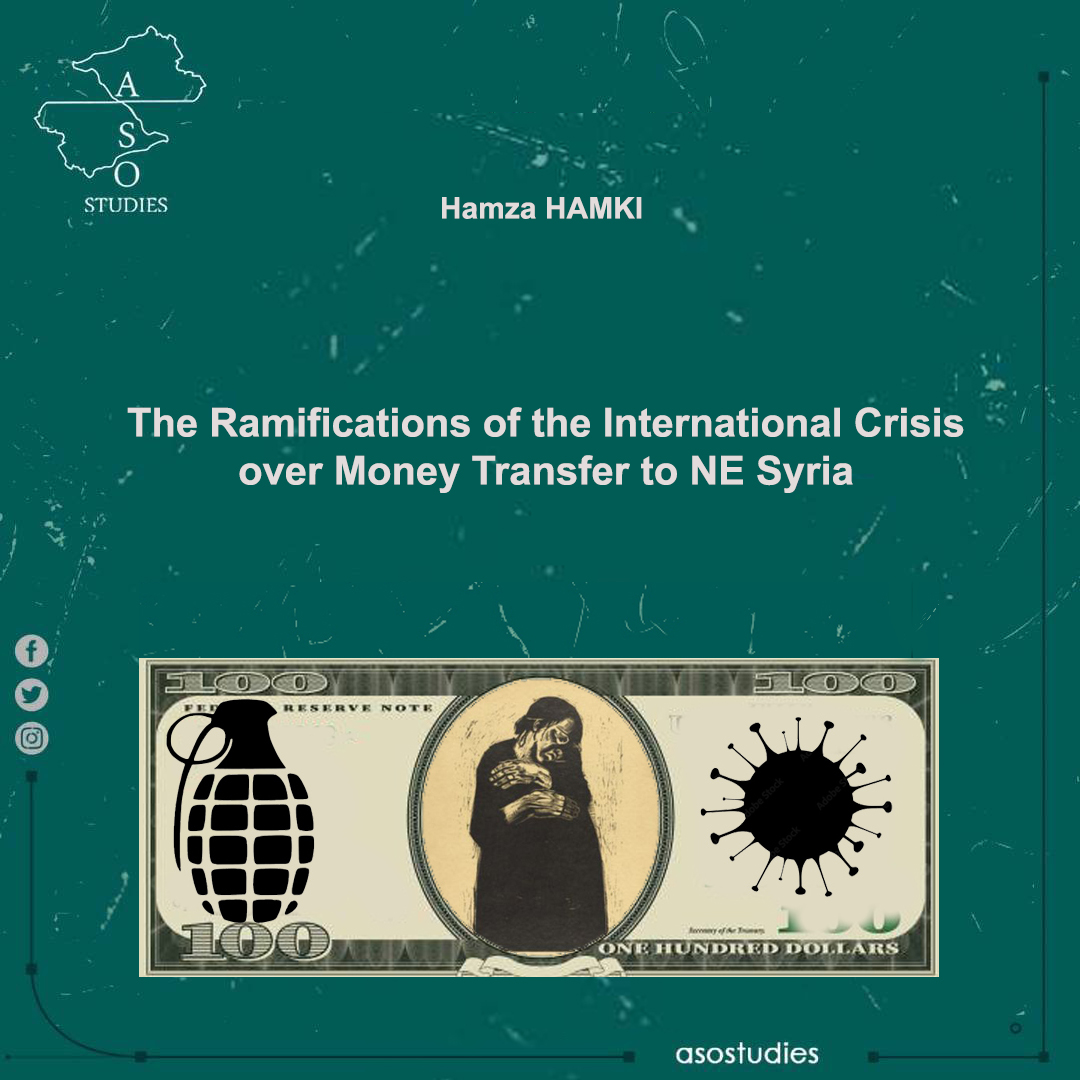The Ramifications of the International Crisis over Money Transfer to NE Syria
Hamza HAMKI
Summary: this research highlights the economic crisis experienced by people in NES, amid the reality that a numerous families count on funds sent by their relatives in diaspora.
In the lines that follow, we will address the methods and the size of funds flowing and the ramifications of the international and regional crisis over that flowing.
Key words:
Autonomous administration Syria money transfer (remittances) Covid 19 Ukraine-war migrants NES( northeast Syria).
Introduction: people across Syria, particularly in NES have been experiencing poor living conditions due to the long period of war and successive crisis, and the collapsing of the Syrian pound has really exacerbated the situation, in addition, lack of job opportunities and falling wages in autonomous administration-controlled regions, furthermore, lack of basic services (water, power, ...). all these and more, have led families to count on funds sent by their relatives in diaspora, anyway, that amount of funds are vulnerable to the political changes and crises across the world like (COVID 19, Russian-Ukraine war).
And for further clarifications to understand, this research has been conducted based on certain categories of people (families receiving funds of that type) across NES, besides some categories in Aleppo (suburbs-controlled by autonomous administration). This research is checked with well-informed resources about the economic situation and another open-resources.
This research is composed of several axes include World Bank data on the flow of remittances to Syria. It also includes an analysis of the results of the questionnaire, the purposes of the beneficiaries of remittances, and the volume of flows by conducting estimated calculations and comparing them with the figures obtained from official and informed sources.
General context:
In addition to commercial banks, fourteen companies are officially licensed. They deliver migrant remittances to beneficiaries inside Syria, these companies have the approval of senders' contracts with abroad.
They are: (Al-Haram, Al-Adham, Al-Fouad, Shakhashiro, Maya, Sham, Zamzam, Al-Nidal, Al-Trust, Al-Fadil, Al-Mutahidah and Al-Diyar). In addition, two companies, Tawasul Worldwide and Al Fouad Internal Money Transfers, which have received official approval to distribute Western Union remittances.
In addition to licensed companies, there are people and traders who are active in the black market in the field of money transfers, via voice calls on social media applications.
These transactions are most prevalent in areas outside the control of the Syrian government, and are almost the only means there, including the northeast of the country under the control of the Autonomous Administration and the northwest areas controlled by (Hay'at Tahrir al-Sham )and (Syrian opposition factions).
Migrants who wish to send money to relatives in Syrian government areas resort to remittance companies operating in non-government-controlled areas, and these companies, in agreement with government-licensed internal remittance companies, send these funds to beneficiaries as an internal transfer. 2
This process avoids migrants incurring high costs for their remittances if they send them directly to remittance companies in government areas, as in addition to the remittance fee, beneficiaries inside will lose part of the amount during the transfer to Syrian pounds, as official and licensed companies adopt the central bank rate, which is lower than the exchange rate on the black market.
Therefore, the Central Bank of Syria has taken several measures to restrict cash transfers from outside the country and limit them to officially licensed remittance companies, so that the value of incoming remittances in Syrian pounds is delivered at the rate of the Central Bank.
On January 18, 2020, Syrian President Bashar al-Assad issued decrees 3 and 4, tightening penalties on non-lira dealers.
Understandings between unlicensed money transferring companies on the one hand and licensed ones on the other often caused the Syrian authorities to shut down and withdraw their licenses, under the pretext that they received money from unidentified persons. 3
In a statement above-mentioned, the Central Bank warned against receiving funds through persons not authorized to engage in remittance activity, and that dealing with licensed companies would expose them to prosecution under terrorist financing laws.
In this context, it is difficult to obtain official data on the value of financial transfers to Syria, in light of the fact that the Central Bank of Syria has not issued statistics on the value of incoming remittances.
However, statements are sometimes issued by those close to the Syrian government, indicating an estimated volume of incoming remittances, but these sources cannot be relied on independently.
To continue reading, please download the full paper
Download

